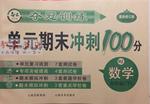题目内容
What will the weather be like tomorrow?
A.Sunny. B.Rainy. C.Cloudy.
练习册系列答案
 夺冠训练单元期末冲刺100分系列答案
夺冠训练单元期末冲刺100分系列答案 新思维小冠军100分作业本系列答案
新思维小冠军100分作业本系列答案
相关题目
题目内容
What will the weather be like tomorrow?
A.Sunny. B.Rainy. C.Cloudy.
 夺冠训练单元期末冲刺100分系列答案
夺冠训练单元期末冲刺100分系列答案 新思维小冠军100分作业本系列答案
新思维小冠军100分作业本系列答案